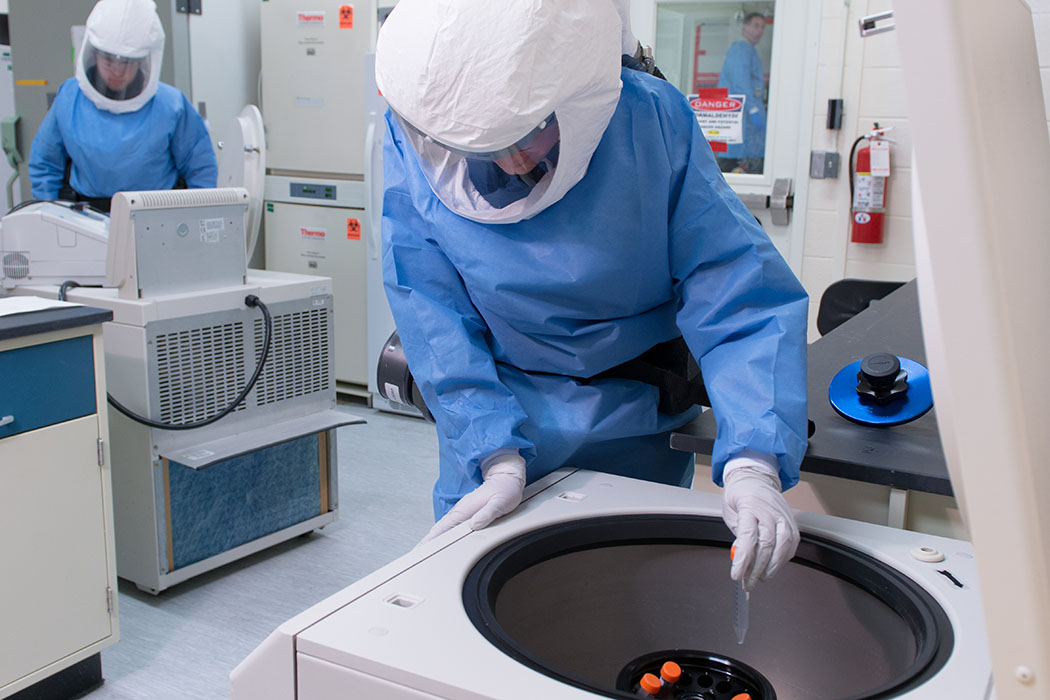High Throughput Screening Enhances Time- and Cost-Effectiveness
Toxicology testing, extrapolating the dangers of the chemicals in our environment, has traditionally been a slow and very expensive process. Because more than 80,000 chemicals have been invented since World War II, it is no longer time- nor cost-effective to employ traditional methods of toxicology. With advances in technology, the Division of Translational Toxicology (DTT) recognized in 2004 that in vitro biochemical- and cell-based assays would allow for much more rapid screening of compounds; in some cases, thousands of chemicals can be assayed in a matter of days. With the goal of moving into a more cost-effective model of toxicological study, the DTT developed the High Throughput Screening (HTS) Initiative.
The goals of the HTS program are:
- To prioritize substances for further in-depth toxicological evaluation;
- To identify mechanisms of action for further investigation like disease-associated pathways;
- To develop predictive models for in vivo biological response, which is called predictive toxicology.
MRIGlobal’s Role in the HTS Initiative
As a part of the HTS Initiative, MRIGlobal manages a chemical inventory for the DTT to source, procure, store, aliquot, and ship compounds of potential toxicological concern to researchers to the DTT partners. By leading this initiative, HTS has helped bring toxicology screening into a new era with predictive modeling to determine the toxicity of chemicals. This saves not only time and money, but potentially lives, as compounds can be studied much more quickly than before.
MRIGlobal maintains the DTT HTS inventory of thousands of chemicals and chemical solutions stored at ambient, refrigerated, or frozen conditions. The MRIGlobal Analytical Team confirms the correct chemical identity and purity and screens chemicals for stability over storage. Once the DTT requests chemicals or solutions to send to designated researchers and collaborators, the MRIGlobal Repository Team prepares aliquots in formats requested by the researcher (vials, 96-well plates, etc.).
After the aliquots are prepared, trained staff begin the process of shipping the compounds to the designated researchers, both domestically and internationally. In addition to packaging each item for transport to prevent damage to the shipped goods, the paperwork is checked for accuracy to ensure the correct items are shipped to the correct place. This includes preparation and filing of any documentation needed for all chemicals regulated by the Department of Transportation, including many in the HTS inventory.
Expertise in Repository Management
Utilizing our expertise in repository management, MRIGlobal has supported the DTT in their goals in developing a web application hosting HTS developmental neurotoxicological data on hundreds of chemicals that may affect the developing nervous system of offspring after maternal transfer. After the DTT creation of the chemical library, MRIGlobal procured highly pure chemicals, confirmed the identity and purity of the chemicals, solubilized the chemicals in dimethyl sulfoxide, and using our automated liquid handling system, created replicate 96-well plates of chemicals in the DTT’s NTP80 and NTP91 libraries. The plates for each were sent to various researchers for their in vitro assays. Chemical information provided by MRIGlobal, including identifiers, suppliers, lot numbers, purity, and the data and results from the various researchers were compiled into the DTT web application, which is publicly available. Using this tool, information about the neurotoxicity of hundreds of compounds is easily accessible to the research community for knowledge and correlation of their data.
GETTING STARTED AT MRIGLOBAL
Contact MRIGlobal to further understand our experience and in-depth knowledge of toxicology services. Our team of toxicology experts provide analytical chemistry services to advance the mission of promoting human health through science-based evaluation of toxicological information.
To learn more about the work we’ve done or how we can help you, contact us today. If you are part of an agency, business, or academic institution seeking assistance with a project, use our Project Quote Tool to get started.
SIGN UP FOR OUR NEWSLETTER
Sign up for the MRIGlobal newsletter! It’s the best way to get the latest updates in the world of applied scientific engineering research delivered directly to your inbox.

